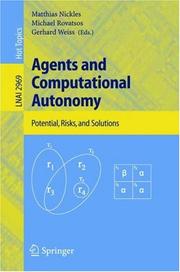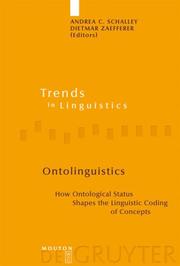| Listing 1 - 7 of 7 |
Sort by
|

ISBN: 1280308230 9786610308231 3540259287 3540224777 Year: 2004 Publisher: Berlin, Heidelberg : Springer Berlin Heidelberg : Imprint: Springer,
Abstract | Keywords | Export | Availability | Bookmark
 Loading...
Loading...Choose an application
- Reference Manager
- EndNote
- RefWorks (Direct export to RefWorks)
This volume contains the postproceedings of the 1st International Workshop on Computational Autonomy – Potential, Risks, Solutions (AUTONOMY 2003), held at the 2nd International Joint Conference on Autonomous Agents and Multi-agentSystems(AAMAS2003),July14,2003,Melbourne,Australia.Apart from revised versions of the accepted workshop papers, we have included invited contributions from leading experts in the ?eld. With this, the present volume represents the ?rst comprehensive survey of the state-of-the-art of research on autonomy, capturing di?erent theories of autonomy, perspectives on autonomy in di?erent kinds of agent-based systems, and practical approaches to dealing with agent autonomy. Agent orientation refers to a software development perspective that has evolved in the past 25 years in the ?elds of computational agents and multiagent systems. The basic notion underlying this perspective is that of a computational agent, that is, an entity whose behavior deserves to be called ?exible, social, and autonomous. As an autonomous entity, an agent possesses action choice and is at least to some extent capable of deciding and acting under self-control. Through its emphasis on autonomy, agent orientation signi?cantly di?ers from traditional engineering perspectives such as structure orientation or object o- entation. These perspectives are targeted on the development of systems whose behavior is fully determined and controlled by external units (e.g., by a p- grammer at design time and/or a user at run time), and thus inherently fail to capture the notion of autonomy.
Computer science. --- Computer Communication Networks. --- Software engineering. --- Artificial intelligence. --- Computer Science. --- Artificial Intelligence (incl. Robotics). --- Software Engineering. --- Intelligent agents (Computer software) --- Artificial intelligence --- Engineering & Applied Sciences --- Computer Science --- Computer communication systems. --- Artificial Intelligence. --- Computer software engineering --- Engineering --- AI (Artificial intelligence) --- Artificial thinking --- Electronic brains --- Intellectronics --- Intelligence, Artificial --- Intelligent machines --- Machine intelligence --- Thinking, Artificial --- Bionics --- Cognitive science --- Digital computer simulation --- Electronic data processing --- Logic machines --- Machine theory --- Self-organizing systems --- Simulation methods --- Fifth generation computers --- Neural computers --- Communication systems, Computer --- Computer communication systems --- Data networks, Computer --- ECNs (Electronic communication networks) --- Electronic communication networks --- Networks, Computer --- Teleprocessing networks --- Data transmission systems --- Digital communications --- Electronic systems --- Information networks --- Telecommunication --- Cyberinfrastructure --- Network computers --- Distributed processing --- Computer networks.
Book

ISBN: 3319134132 3319134124 Year: 2014 Publisher: Cham : Springer International Publishing : Imprint: Springer,
Abstract | Keywords | Export | Availability | Bookmark
 Loading...
Loading...Choose an application
- Reference Manager
- EndNote
- RefWorks (Direct export to RefWorks)
This book contains revised and significantly extended versions of selected papers from three workshops on Uncertainty Reasoning for the Semantic Web (URSW), held at the International Semantic Web Conferences (ISWC) in 2011, 2012, and 2013. The 16 papers presented were carefully reviewed and selected from numerous submissions. The papers included in this volume are organized in topical sections on probabilistic and Dempster-Shafer models, fuzzy and possibilistic models, inductive reasoning and machine learning, and hybrid approaches.
Computer science. --- Mathematical logic. --- Mathematical statistics. --- Data mining. --- Artificial intelligence. --- Computer Science. --- Artificial Intelligence (incl. Robotics). --- Mathematical Logic and Formal Languages. --- Probability and Statistics in Computer Science. --- Data Mining and Knowledge Discovery. --- AI (Artificial intelligence) --- Artificial thinking --- Electronic brains --- Intellectronics --- Intelligence, Artificial --- Intelligent machines --- Machine intelligence --- Thinking, Artificial --- Bionics --- Cognitive science --- Digital computer simulation --- Electronic data processing --- Logic machines --- Machine theory --- Self-organizing systems --- Simulation methods --- Fifth generation computers --- Neural computers --- Algorithmic knowledge discovery --- Factual data analysis --- KDD (Information retrieval) --- Knowledge discovery in data --- Knowledge discovery in databases --- Mining, Data --- Database searching --- Mathematics --- Statistical inference --- Statistics, Mathematical --- Statistics --- Probabilities --- Sampling (Statistics) --- Algebra of logic --- Logic, Universal --- Mathematical logic --- Symbolic and mathematical logic --- Symbolic logic --- Algebra, Abstract --- Metamathematics --- Set theory --- Syllogism --- Informatics --- Science --- Statistical methods --- Artificial Intelligence.
Book

ISBN: 9783540897651 Year: 2008 Publisher: Berlin Heidelberg Springer Berlin Heidelberg
Abstract | Keywords | Export | Availability | Bookmark
 Loading...
Loading...Choose an application
- Reference Manager
- EndNote
- RefWorks (Direct export to RefWorks)
This book constitutes the thoroughly refereed first three workshops on Uncertainty Reasoning for the Semantic Web (URSW), held at the International Semantic Web Conferences (ISWC) in 2005, 2006, and 2007. The 22 papers presented are revised and strongly extended versions of selected workshops papers as well as invited contributions from leading experts in the field and closely related areas. The present volume represents the first comprehensive compilation of state-of-the-art research approaches to uncertainty reasoning in the context of the semantic Web, capturing different models of uncertainty and approaches to deductive as well as inductive reasoning with uncertain formal knowledge.
Operational research. Game theory --- Discrete mathematics --- Mathematics --- Computer science --- Artificial intelligence. Robotics. Simulation. Graphics --- Computer. Automation --- toegepaste informatica --- discrete wiskunde --- stochastische analyse --- informatica --- informatietechnologie --- wiskunde --- robots
Digital

ISBN: 9783540897651 Year: 2008 Publisher: Berlin, Heidelberg Springer Berlin Heidelberg
Abstract | Keywords | Export | Availability | Bookmark
 Loading...
Loading...Choose an application
- Reference Manager
- EndNote
- RefWorks (Direct export to RefWorks)
Operational research. Game theory --- Discrete mathematics --- Mathematics --- Computer science --- Artificial intelligence. Robotics. Simulation. Graphics --- Computer. Automation --- toegepaste informatica --- discrete wiskunde --- stochastische analyse --- informatica --- informatietechnologie --- wiskunde --- robots
Digital

ISBN: 9783319134130 Year: 2014 Publisher: Cham Springer International Publishing
Abstract | Keywords | Export | Availability | Bookmark
 Loading...
Loading...Choose an application
- Reference Manager
- EndNote
- RefWorks (Direct export to RefWorks)
This book contains revised and significantly extended versions of selected papers from three workshops on Uncertainty Reasoning for the Semantic Web (URSW), held at the International Semantic Web Conferences (ISWC) in 2011, 2012, and 2013. The 16 papers presented were carefully reviewed and selected from numerous submissions. The papers included in this volume are organized in topical sections on probabilistic and Dempster-Shafer models, fuzzy and possibilistic models, inductive reasoning and machine learning, and hybrid approaches.
Mathematical logic --- Operational research. Game theory --- Computer science --- Information systems --- Artificial intelligence. Robotics. Simulation. Graphics --- stochastische analyse --- machine learning --- computers --- database management --- informatietechnologie --- wiskunde --- KI (kunstmatige intelligentie) --- logica --- computerkunde --- robots --- data acquisition --- AI (artificiële intelligentie)
Digital

ISBN: 9783642359750 Year: 2013 Publisher: Berlin, Heidelberg Springer
Abstract | Keywords | Export | Availability | Bookmark
 Loading...
Loading...Choose an application
- Reference Manager
- EndNote
- RefWorks (Direct export to RefWorks)
This book contains revised and significantly extended versions of selected papers from three workshops on Uncertainty Reasoning for the Semantic Web (URSW), held at the International Semantic Web Conferences (ISWC) in 2008, 2009, and 2010 or presented at the first international Workshop on Uncertainty in Description Logics (UniDL), held at the Federated Logic Conference (FLoC) in 2010. The 17 papers presented were carefully reviewed and selected from numerous submissions. The papers are organized in topical sections on probabilistic and Dempster-Shafer models, fuzzy and possibilistic models, inductive reasoning and machine learning, and hybrid approaches.
Information retrieval --- Mathematical logic --- Operational research. Game theory --- Computer science --- Information systems --- Artificial intelligence. Robotics. Simulation. Graphics --- Computer. Automation --- IR (information retrieval) --- stochastische analyse --- machine learning --- computers --- informatica --- informatiesystemen --- database management --- informatietechnologie --- wiskunde --- KI (kunstmatige intelligentie) --- logica --- computerkunde --- robots --- data acquisition --- AI (artificiële intelligentie)


ISBN: 9783110197792 9783110189971 Year: 2008 Publisher: Berlin ;; Boston De Gruyter Mouton
Abstract | Keywords | Export | Availability | Bookmark
 Loading...
Loading...Choose an application
- Reference Manager
- EndNote
- RefWorks (Direct export to RefWorks)
| Listing 1 - 7 of 7 |
Sort by
|

 Search
Search Feedback
Feedback About UniCat
About UniCat  Help
Help News
News